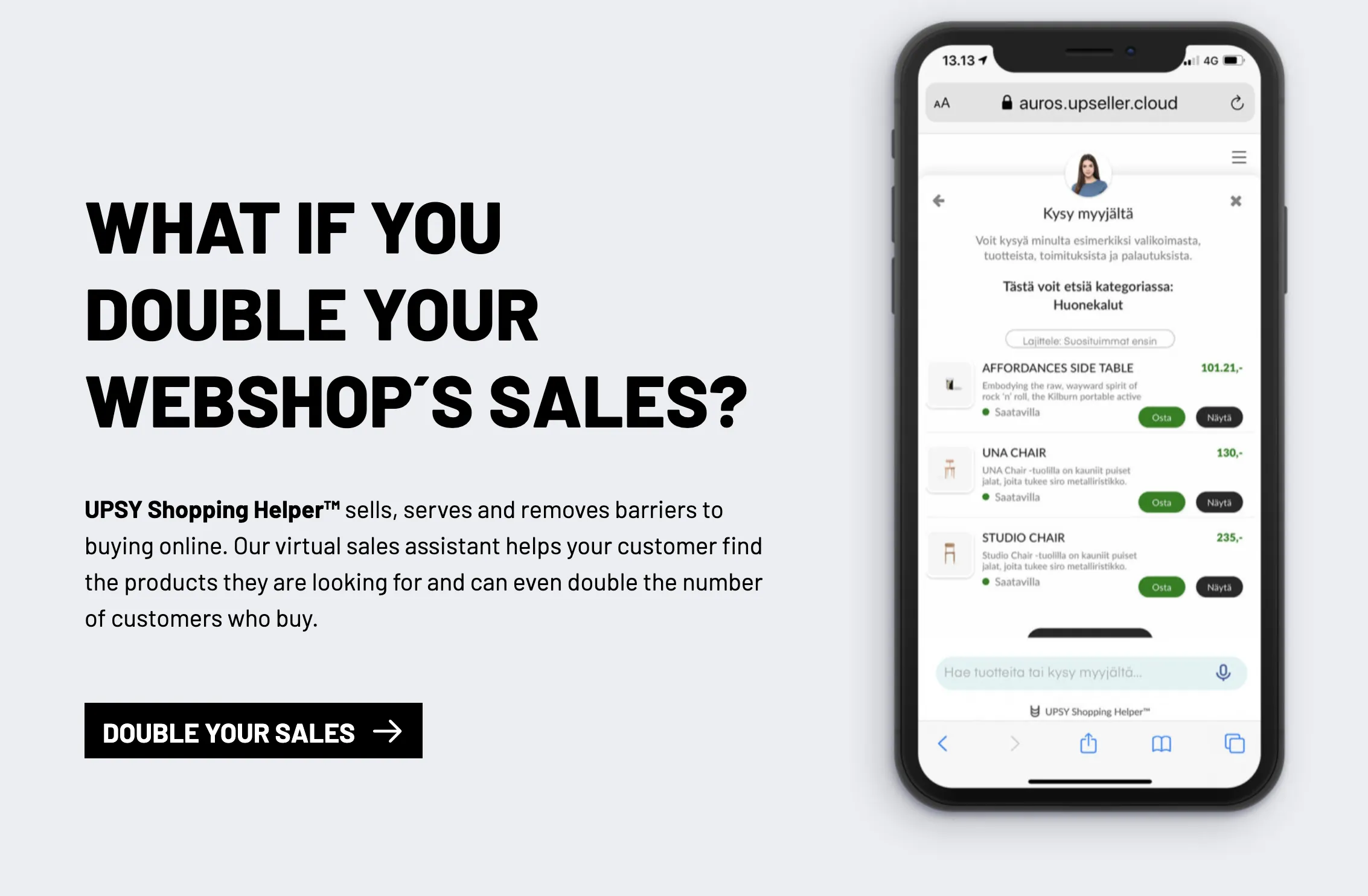
Conversational AI agents for e-commerce
At first, the two topics of e-mobility and e-commerce sound very separate, don't they? The first encompasses things like vehicle industrial design, drivetrains, physical charging stations, supply chains... and the other is about shopping for goods, deliveries, electronic payments, conversion optimization.
But as it happens, those two topics have been bulk of the work we've been doing as MaaS Solutions lately.
Turns out they have a lot in common - the shift in consumer preference and behavior, moving to online consumption patterns, contactless commerce, avoiding crowded places like public transport or supermarkets, application of machine learning to improve key metrics, mobile interfaces - all of which are very interesting, favorite topics to work on here at MS.
During the summer, our projects have included plenty of cross-cloud solutions in these two verticals. Main one has been Upseller, a Finnish company specializing in using machine learning to help online shops to sell more. To double their sales, in fact. That is done by utilizing a mixture of ML and human power to sell, just like a salesperson would do in physical retail. It's different from customer service chats, in that the algorithms as well as the humans behind the interface are sales oriented, incentivized to sell. That may involve understanding and solving customer problems, but with a measured impact on increasing sales.
We've found this approach rather unique and it was a good time to jump in to help Upseller with their next gen product.
The previous gen product had its limitations. It's been designed in steps, as a result of customer projects, so it has evolved without a holistic product vision. As a result, the implementation projects to a new customer may take weeks, there is personnel training involved, and while the end result is good for the customer, scaling the process from the company point of view is too slow, which limits the growth of the company.
Our initial contact with Upseller started in early summer 2020 as a project to help out with growth in the technology side. However after a quick analysis, this task morphed into a product development role in formulating the new ML-powered conversion optimization tools - the Upsy Shopping Helper version 2. It was quite a lightning start, the concept had been designed pretty far and team was ready to start developing, so the only way to manage this was to take things step by step.
- MVP based on the core use cases identified in the UX work
- Set up metrics to prove the concept
- Test with own store
- Test with early adopter customer
- Implement changes and Update the plan accordingly
- Test again
The hypothesis is that compared to physical retail - say a grocery store - conversions in a small to medium e-commerce store are inverted. Whereas in bricks & mortar, maybe two people out of 100 walk out without buying anything from a supermarket. Online, maybe two people out of a 100 end up buying something. If we can make this three, or four people out of 100, we've just doubled the sales. We'll approach the problem by a classic 80/20 rule - by unblocking the 20% of issues that are blockers in 80% of cases, by surfacing up product questions in the product context, and using the context for selling more by surfacing products that are highly relevant. Sounds easy? Well, it takes the Iterative Product Development approach to get done.
The early result is pretty nice I must say:

Upsy is a machine learning powered product search that is aimed at selling more. It may look a bit like a chat, which is intentional, because people who interface with it are curious about it, thus more likely to also continue based on its recommendations. Upsy can be configured to be very subtle (just an avatar) or pretty pushy, proactively coming in a suggesting products to buy.
Technology wise, Upsy has been developed partly by leveraging existing, rather modern, serverless infrastructure that Upseller used to power their chat bot experiences, but since Upsy is all inhouse technology, it was a chance to take in most of the infrastructure and data operations as well. So in the end Upsy is a serverless multi-cloud solution which runs serverlessly with Azure Functions developed with NodeJS/TypeScript/CosmosDB, and a data operation running natively in AWS with Glue, Athena, SageMaker, coupled with serverless NodeJS behind API Gateway.
Our role in this project has been that of a typical interim CTO - leading the technology creation and steering the product development to a successful outcome, and plugging the holes in the technical team, where necessary. That includes Our collaboration continues in refining the Upsy experience with the help of the significant traffic it generates.